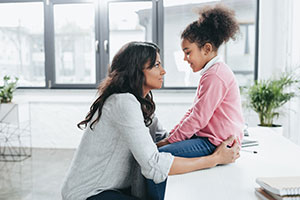Help Your Child By Taking Care of Your ADHD First

Helping your children when they have ADHD to be better organized in their daily lives can be a challenge for any parent—but it’s magnified when you’re also a parent who has ADHD. And when one quarter to one half of all parents of children with ADHD have an ADHD diagnosis themselves, it’s a significant issue.
“When a child is diagnosed, one of the first things that is recommended is behavioral treatment at home and at school, and organizational interventions, to really try to engineer the type of environment that’s going to help the child be as successful as possible,” says Andrea Chronis-Tuscano, PhD, professor of psychology and director of the Maryland ADHD Program at the University of Maryland at College Park and a member of CHADD’s Professional Advisory Board.
“That involves a great deal of effort on the part of the parents and school really trying to create a highly structured, predictable, consistent environment for the kids so that they know exactly what to expect,” she says. “There’s a lot of scaffolding from the parents and teachers to provide organization and really model for the kids how to be organized and successful.”
Scaffolding support
Being an engaged parent and providing a structured home environment are two of the most important elements in your child’s success over time, Dr. Chronis-Tuscano says. Scaffolding—when a parent or teacher demonstrates to a child how to do something and then stands back, ready to offer help only when it’s needed and requested—is an essential part of helping children master organization skills. But when parents struggle with the same ADHD issues of forgetfulness and organization, they may not be prepared to provide that level of support to their children.
“We know that how the environment is structured can either support the child’s development in a positive direction, or it can contribute in negative ways that can lead to worse impairment or the development of co-occurring problems, and can contribute to the child having even more difficulty,” Dr. Chronis-Tuscano says.
But when providing structure is made difficult by your own ADHD symptoms, what can you do to meet this need for scaffolding?
Treatment for parents and children
When an adult has an ADHD diagnosis, treatment can include medication management, cognitive behavioral therapy (CBT), and education about ADHD and lifestyle support. When you’re a parent of a child with ADHD, it is perhaps even more important that you work closely with a professional to follow through with treatment.
You’ve heard the airline safety reminder to put your own oxygen mask on before helping your child with his or hers. Dr. Chronis-Tuscano says providing parents with their own ADHD treatment and encouraging them to be consistent—putting on their own masks first—is key to their functioning at their best and helping to building the needed scaffolding for their children.
“If the parent’s ADHD isn’t treated, then they sure as heck can’t help their kids be organized, and structured, and do their best with their schoolwork,” she says. In a review of studies, Parent ADHD and Evidence-Based Treatment for Their Children: Review and Directions for Future Research, Dr. Chronis-Tuscano and her colleagues found that some combination of medication, CBT, and parent-child therapy is best, noting it is essential that mental health professionals tailor treatment to the individual adult, rather than take a “one size fits all” approach. That can include receiving treatment for substance abuse and depression, along with other mental health disorders, that are so often co-occurs with ADHD in adults.
Thriving parent, thriving child
As a parent with ADHD, you might struggle to schedule your child’s doctors’ appointments, get medication refilled, and give that medication to your child on a schedule. Admitting that it can be tricky helping parents navigate that routine, Dr. Chronis-Tuscano says avoiding parent blaming while engaging in candid conversations is the best way for mental health professionals to help parents move forward. Even though it’s been disproven, the idea that they could be responsible in some way for mental health conditions—ranging from autism to schizophrenia and including ADHD—is something some parents cling to, and it’s important to reinforce the fact that they are not.
“We’re way past that,” Dr. Chronis-Tuscano says. “We know that ADHD is a neurodevelopmental disorder, and we know that there are genetic causes, and we know there are neurobiological causes.”
Combining treatment options and psychoeducation is the best approach to giving parents the tools they need, but doing so can also create new issues, she says.
Dr. Chronis-Tuscano says she would tell a parent, “One of the things that we want to do is to take a broader, more comprehensive approach to your child’s care that includes a focus on helping you with your ADHD, which might include medication or cognitive behavioral therapy, teaching you various ways to address some executive functioning difficulties that might make parenting more challenging for you.”
But, she would add, success would also mean you might grow to understand your child and your shared struggles on a deeper, more meaningful level.
Looking for more?
